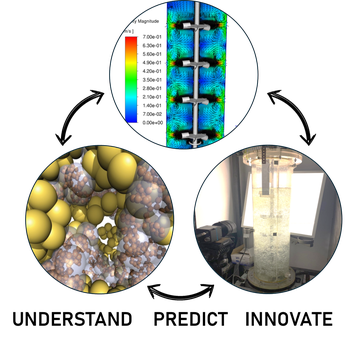The research activity of the Chemical Engineering@CHIMIND group of the Department of Industrial Chemistry “Toso Montanari” at the Alma Mater Studiorum – University of Bologna is dedicated to the study and analysis of transport phenomena and multiphase interactions in systems of interest to the chemical, biochemical, and formulation industries.
This expertise—developed across multiple scales, from the molecular to the equipment level, and through advanced experimental and numerical tools—is leveraged to innovate and optimize technologies and processes, both traditional and emerging.
The group’s activities synergistically integrate advanced experimental research and multi-scale modeling.
The research group was founded by Prof. Franco Magelli in the early 1980s with the goal of strengthening the connection between laboratory research, the educational programs of the Faculty of Industrial Chemistry, and industrial applications.
The experimental investigations employ non-intrusive optical and tomographic techniques, such as Particle Image Velocimetry (PIV) in planar and stereoscopic configurations and Planar Laser Induced Fluorescence (PLIF) for the analysis of mixing times and transport phenomena, as well as Electrical Resistance Tomography (ERT) for the study of opaque and dense systems.
These are complemented by power measurements, the characterization of bubble, droplet, and solid particle size distributions using optical instruments (e.g., Malvern Spraytec), and Passive Acoustic Emission techniques, used for in-line monitoring, rapid identification of multiphase regimes, and the evaluation of rheological properties.
Applications span a broad range of equipment, including mechanically agitated reactors, static mixers, fluidized beds, membrane modules for gas separations, inertial separators, model bioreactors, and systems for pharmaceutical and biomedical applications.
In recent years, the group has also strengthened the use of sensing fusion—the integrated acquisition and processing of multiple experimental signals—and Artificial Intelligence techniques for advanced process monitoring and control.
The modeling component includes the development of lumped- and distributed-parameter computational approaches aimed at representing processes on different scales.
Fluid-dynamic analysis of equipment is performed using Computational Fluid Dynamics (CFD) codes, both commercial (ANSYS Fluent) and open-source (OpenFOAM), focusing on the simulation of multiphase systems operating in regimes from laminar to turbulent, with attention to both numerical aspects and the development and validation of physical models.
Activities include the verification and refinement of mesoscale models, as well as the construction of reduced models for process optimization and control.
Specialized analysis and modeling techniques, such as frequency analysis and Population Balance Modeling, are applied to both numerical datasets and experimental data.
These capabilities are complemented by molecular and advanced mathematical modeling approaches, including molecular dynamics, interfacial free energy calculations, machine learning, and evolutionary algorithms to simplify the representation of complex processes.
The integration of these methodologies enables a deep understanding of the fundamental phenomena governing multiphase systems, providing a solid theoretical basis for process design and industrial scale-up.
The group has extensive experience in applied research and collaborates with numerous industrial partners—from multinationals to start-ups—as well as with national and international academic institutions, as evidenced by its publications and long-standing research projects.
ERC Sectors
-
PE8_2 – Chemical engineering, technical chemistry
-
PE8_4 – Computational engineering
-
PE8_5 – Fluid mechanics, hydraulic-, turbo-, and piston engines
-
PE8_12 – Sustainable design (for recycling, environment, eco-design)
Scientific Coordinator
Giuseppina Montante
Development of advanced modeling techniques for innovative equipment and processes using CFD methods.
Group Members
-
Federico Alberini
Development of experimental techniques (PIV, ERT, passive acoustic, optical techniques), machine learning methods, and process monitoring sensors.
-
Nicodemo Di Pasquale
Development of multi-scale models (from micro- to macro-scale) for chemical process simulations.
-
Francesco Maluta
Numerical simulation of equipment and processes using commercial and open-source computational codes.
-
Alessandro Paglianti
Development of experimental techniques (PIV, ERT, optical methods) and innovative equipment for process intensification.
National and International Collaborations
-
University of Naples Federico II, Italy – Department of Chemical, Materials and Industrial Production Engineering – Prof. Gaetano D’Avino, Prof. Nino Grizzuti, Prof. Rossana Pasquino
-
University of Udine, Italy – Department of Engineering and Architecture – Prof. Cristian Marchioli
-
Politecnico di Torino, Italy – Department of Applied Science and Technology – Prof. Daniele Marchisio, Prof. Antonio Buffo, Prof. Gianluca Boccardo, Prof. Marco Vanni
-
INSA Toulouse, France – Toulouse Biotechnology Institute – Prof. Jerome Morchain
-
The University of Manchester, UK – School of Chemical Engineering & Analytical Science – Dr. Claudio Pereira da Fonte
-
The University of Birmingham, UK – School of Chemical Engineering – Prof. M.J. Simmons, Prof. A. Alexiadis
-
University College London, UK – Department of Biochemical Engineering – Prof. Martina Micheletti
-
University College London, UK – Department of Mechanical Engineering – Prof. A. Ducci
-
University of Chemistry and Technology, Prague, Czech Republic – Department of Chemical Engineering – Dr. Ing. Tomáš Moucha
-
Chongqing University, China – College of Chemistry & Chemical Engineering – Prof. Zuohua Liu
-
University of Saskatchewan, Canada – College of Engineering – Prof. Suzanne Kresta
-
University of Alberta, Canada – Faculty of Engineering – Prof. Alexandra Komrakova
-
The University of Liverpool, UK – School of Engineering – Dr. Davide Dapelo
-
Karlsruhe Institute of Technology, Germany – Institute for Mechanical Process Engineering and Mechanics – PD Dr. Matthias Krause
-
The University of Manchester, UK – School of Chemistry – Prof. Paola Carbone
-
University of Leicester, UK – School of Computing and Mathematical Sciences – Prof. Ruslan Davidchack
